- Home
- Micheal Maxwell
East of the Jordan (A Logan Connor Thriller Book 2) Page 6
East of the Jordan (A Logan Connor Thriller Book 2) Read online
Page 6
Eric and Logan jogged through the jagged streets strewn with rubble and pieces of broken buildings. The buildings’ frameworks stretched naked towards the sky like dead trees stripped of all their bark and leaves. They were skeletons of what they once were. This land was shattered and stripped by constant war.
Eventually, Logan stopped running and start walking. A stitch knitted his side with pain and tightness. The muscles in his back flared and spasmed. He gasped for air. In addition to going to the gym more, he vowed never to spend a prolonged period in the Deep South again. Even the vegetables there were deep-fried. He was carrying at least five pounds of fried okra around his belly.
It took them almost six hours to run/walk to the Jubba River. As they reached the banks of the brown river, the sun just began to paint the sky over the buildings behind them. Gray-blue light blossomed behind the buildings, casting a ghostly tint to the city.
Palm trees leaned out over the water as if leaning in to hear a secret. An old man in cargo pants and no shirt was already shoving a small boat into the water. There was a tackle box and a fishing pole visible as he waded out into the murky water.
Logan gasped, “Let’s find a boat and get out of here.”
They walked down to the edge of the water and began picking their way through the mud, searching for an unclaimed fishing boat. After a few minutes, Logan spotted a small flat-bottomed aluminum boat a little ways ahead tied to a palm tree, bobbing in the water.
“That’ll work,” Logan said.
Eric set about untying the boat. Logan crouched behind a tree, watching their backs. Eric got it untied and pushed it out into the water. He belly-flopped into the skiff like a kid who didn’t have much experience with watercraft. It rocked back and forth before he could get steady, then Logan hopped into it with more grace. They grabbed the oars and started paddling. They were only a few feet off the shore when they heard someone shouting. Logan looked behind him. A fisherman was sprinting down the dock with a tackle box and a fishing pole. He threw down his gear and splashed into the water.
Eric and Logan paddled faster. Logan hated taking someone’s boat as fishing was probably the man’s livelihood. He reached into his pocket and found a wad of dollars, then tossed them onto the shore without even counting them.
The man stood on the edge of the water, screaming at them. Logan didn’t understand Somali, but he knew when he was being cussed out. The man made some rude gestures and then snatched up the dollar bills. He stomped back towards his discarded fishing gear.
Hopefully, that was enough money to buy a new boat.
They paddled against the current, making slow progress up the river.
After about an hour of paddling, they heard the distant drone of outboard motors. Speedboats were racing in their direction. The sound grew louder.
CHAPTER SIX
Logan and Eric paddled north on the Jubba River in their stolen fishing boat that was little more than a flat-bottomed canoe. The sound of outboard motors grew louder as they neared a grove of trees jutting out into the river. The boats would be coming around the bend at any moment. Logan and Eric paddled hard for the copse of trees. Soon, the sound of oncoming speedboats was all they could hear.
They struck the bank of the wooded outcropping. Both of them hopped out of the water, sinking into mud up to their knees. They trudged through the sucking mud, dragging the boat out of the water.
The boats sounded as if they were on top of them by now. As they got the vessel out of the water, they flopped onto their bellies and crawled into the stand of leaning palm trees. Logan put a finger to his lips as if he needed to tell Eric to be quiet. Logan watched the water through the cover of a palm frond.
The water churned and lapped, hitting the bank in waves. Water splashed across his face, shocking him with its cold bite in the early morning hours.
A few seconds after the waves started hitting, boats sped into view. There were four of them. They didn’t look uniform. They were speedboats, small sleek-hulled machines, with massive outboard motors kicking up massive wakes. They were four different kinds of boats, but they were all painted the same in a drab green primer with a brown line snaking through a blue circle on the side.
Logan whispered to Eric, “Do you recognize that symbol?”
Erick shook his head.
Three of the boats sped past them, churning the water as they raced by. The fourth boat slowed down, its engine chugging slowly. The speedboat hit the bank of the river and skidded up out of the water. Five men hopped out. They were wearing dark camouflage fatigues and pants tucked into black combat boots. They carried black M-16 rifles that looked like Vietnam War surplus. The leader of the group wore epaulets looked like an arrow with five stripes on his shoulders. The others following him wore two or three stripes on their epaulet arrows.
The leader barked to the others in a language Logan didn’t know.
Eric whispered, “That’s Amharic.”
Amharic? So, Ethiopian?
They didn’t look like the Ethiopian military, though. Their boats were of irregular designs. The brown and blue symbol on their arms was not the Ethiopian flag, so they were some kind of paramilitary then.
Eric pulled Adam’s pistol out of his waistband. Logan nodded at it. “You any good with that?”
Eric held it like a live snake. “I’ve never killed anyone.”
Logan held out his hand. “Let’s keep it that way.”
Eric handed him the gun. Logan took the gun and started a slow, deliberate low crawl towards the water.
He hissed at Eric, “C’mon. We’re stealing a better boat.”
Eric slithered on his belly through the mud as they made their way to the water just as the camouflaged men stomped into the dense tree cover. Logan looked one more time at the boat to make sure he knew in his mind where it was docked. Then, he slipped underwater and stroked downstream. Logan let the current carry him towards the boat, only peeking his head up once to gasp for air. He ducked his head back under and floated towards the speedboat.
When he lifted his head a second time, he was within arm’s reach of the boat. He scurried onto the bank, making sure to stay low. Eric was right behind him. He shoved the speedboat into the water and crawled in. Eric clumsily clambered in, his knees and elbows banged against the hull of the boat, ringing the metal like a drum. In the quiet morning of the river, the sound was deafening.
The leader of the group shouted in Amharic from somewhere in the trees. Their boots crunched the brush underfoot as they ran for the shore.
The boat bobbed out into the water, and Logan yanked the pullcord. The engine sputtered, and nothing. He pulled again. It turned over, chugged, and died. He pulled. Chug, chug, nothing. He yanked harder, it sparked, turned a few times, and then went quiet again.
The men in camouflage emerged from the trees. Logan jerked the cord. The engine growled. The first soldier through the woods dropped to a knee and aimed his M-16. Logan was standing up to pull the cord. He looked directly in the eyes of the man with the rifle. He looked younger than Logan. They stared at each other for a moment. Time froze. He was looking straight into the empty black hole of the barrel. He’d gotten this far, and here it was going to end.
The kid in camouflage pulled the trigger. Click. Nothing.
Damn M-16s, Logan thought.
He twisted the throttle on the boat engine and yanked it sideways. The boat jumped forward, spinning a donut in the water that sprayed a wave of water at the shore. He got the vessel facing the right way, straightened it up, and twisted the throttle again. The boat’s front end lifted out of the water as it took off.
The other M-16s didn’t jam. They fired sprays of gunfire at them. Water splashed up in tiny eruptions everywhere bullets hit, like rain falling on the water all around them.
They raced around a corner and disappeared into the open brown water of the Jubba River. Logan plopped down on his butt beside the outboard motor, holding the engine wide open. The nose of the
boat stayed up in the air, and the hull bounced against waves hitting as hard as sidewalk curbs.
He let out a breath.
“I don’t know who they were, but that was way too close for comfort.”
Eric groaned, “Logan. I don’t…something’s wrong.”
Eric turned around. The entire front of his shirt was sopping wet with bubbly crimson blood. He opened his mouth to say something, but instead, a spurt of bright red blood shot out onto his chin. He wobbled backward and then keeled over forward. His head bounced with a hollow thud against the boat’s bottom.
* * *
Abu Kishaa never said Sydney was a hostage; he was never that overt with his plans. He sent Eric and Logan away on some kind of mission, and then he told her to stick close to Hiba and help her with whatever she needed. Two days passed since Logan and Eric left. Everywhere she went with Hiba, one of the mysterious Brothers came along. He didn’t help them carry anything or plant anything or run the irrigation pipes. He just stood around with his hands on the butt of the AK-47 on the strap around his shoulder.
For two days, they worked running an irrigation pipe from the Dead Sea. The sea was about a hundred feet below the cave’s mouth, so they needed to use an intricate method of pipework and pumps. They started with a huge PVC pipe. Hiba, Sydney, and several of Abu Kishaa’s followers dug a trench with shovels and buried the line below water level. They ran it along the shore for a while and then coupled it to a slightly smaller pipe, then ran the slightly smaller pipe for about twenty feet and connected that to another smaller line. Every twenty feet or so, the tube got smaller. They buried it as they went along. Eventually, they got to the mouth of the cave, and the pipe was no bigger in diameter than a garden hose. Hiba attached a garden hose to the line there.
In conjunction with a pump and the end, the progressively narrower lengths of pipe should create enough pressure to run the water up the hill and into the garden hose.
Hiba gave the signal from the mouth of the cave. One of the followers uncapped the large piece of pipe that was underwater. Nothing happened.
Hiba chuckled nervously. “I saw it in an old western movie. It’s how they used to mine for gold on the side of the mountains.” She chuckled again. “At least, I thought they did.”
Sydney scratched her head. She didn’t know too much about physics and hydraulics, but it seemed like it should work. Maybe they tried to increase it too aggressively, and there wasn’t enough…
Water spurted out of the hose. Salty, kelpy Dead Sea water gushed as if they’d turned a spigot.
Hiba whooped. “Oh, hey. It’s working. Wow. Awesome. I knew it would work.”
She didn’t seem very confident when she said that.
Hiba struggled to screw a trigger nozzle on the hose. After some fussing and getting her pants soaked in salty seawater, she got the nozzle screwed on to stop the flow of water.
“Okay,” Hiba said. “We’ve got water. Now, we just need to mine the soil from the cave floor.”
Sydney sighed. With very little hope in her voice, she said, “Do we have an excavator or a backhoe?”
Hiba picked up a plastic five-gallon bucket and a shovel. “We’ve got tons of excavators.”
Why did absolutely everything have to be so backbreaking? Hiba and Sydney handed out plastic buckets. The followers descended into the cave, walking into the dark, gray light. Once they reached the babbling brook at the bottom of the cave, they started a bucket line. Hiba would pour shovelfuls of dirt into a bucket. Once it got full, Sydney would hand it to a follower. They would pass it to the next, and on and on it went until it got to the mouth of the cave. Then Sydney would get another bucket, which she would put down on the ground, and Hiba would fill. She’d hand the full bucket to a follower and grab an empty one. Eventually, sweat clamped her soaked shirt to her chest. They took only small breaks to drink water.
Down in the cave, Sydney lost track of time. She thought she must have been down there for hours because the light was beginning to change. When they went down into the cave, the gray light was filtering in at an angle. Now, it was coming in straight from overhead. Noon? Or in must be close to that.
Eventually, Hiba jabbed the shovel in the ground, and the metal head scraped against solid rock.
She joked, “Looks like we’ve hit rock bottom.”
She scraped the ground a few more times and poured some little clumps of mud into a bucket that wasn’t even half full.
“Okay,” Hiba said, “let’s call it a day.”
The followers looked relieved. They picked up their empty buckets and marched back towards the light. Sydney picked up the half-empty bucket and lugged it towards the cave’s mouth. Hiba followed with her shovel.
The light blinded Sydney at first, like turning on the bedroom lights first thing in the morning. She shaded her eyes with her hand so they could adjust. Eventually, they adapted, and she saw a mound of mud almost ten feet tall. It was probably ten feet by ten feet square.
“Is that enough?” Sydney asked.
Hiba smiled. “It’s plenty. We’ll set up tarps to filter the light. It’ll be like an open-air greenhouse.”
They ate a lunch of pita bread and strips of lamb. After lunch, they set up their greenhouse. They used extra tent poles and fabric to create a fabric roof. Hiba spread the dirt underneath until it was about a foot thick and used their PVC hose system to wet the soil.
Then, it was just a matter of seeding. The followers planted a silphium—qedex—seed about two knuckles deep and brushed some soil over it. That took the rest of the day. In the end, Hiba wet them down with Dead Sea water straight from the source. The sun set, and a chill came riding on the breeze.
“How long before they sprout?” Sydney asked.
Hiba shrugged. “No idea. Hopefully, not long. If it takes too long, Abu Kishaa will probably kill me.” She chuckled at that, but it didn’t seem like a joke.
As night fell, everyone headed back to their tents. Some of them milled around, talking to each other. Circles of people formed up around fires. They held hands and prayed together, speaking softly and thoughtfully. Sydney recognized the scenes of prayer that she’d been watching for days. They were interesting. They didn’t have set prayer times as Muslims did, but they did have a ritual.
The followers took their shoes off because Abu Kishaa said that being grounded on the earth was important. They uncovered their heads if they were wearing head coverings and bowed, then held hands with whoever was around and swayed side to side. They ran through a ritualized prayer. They spoke in their native languages for now, but Abu Kishaa said he would teach everyone Moabite. Soon, it would be the only language of prayer and worship. Their all-important holy book was supposedly going to be finished soon. They ran through a long, proscribed prayer as they started out facing north, then turned east with another verse, then south at another verse. Lastly, they turned one more quarter-turn to face the west to say the final verse. They turned back north when they finished and muttered something like “amen.”
Sydney watched this ritual play out all over the camp as she headed back to her tent. Most of them were gathered around fires for their prayers. A few of them tossed greenish chunks of qedex sap into the fire, staining the flames green. They breathed deep as they performed their devotions.
You’re not experiencing God, Sydney thought. You’re just tripping off your face. If that’s experiencing God, I experienced God every weekend in college. It costs $30. Less, if you show some cleavage.
Sydney made her way to her tent. She carried a sleeping bag, a battery-powered lantern, and a laptop that she charged on the generator every few days. She didn’t keep anything important on the computer. Mostly it held a journal that was full of lies. She password protected it, but she knew that Abu Kishaa’s followers were reading it regularly. The best place to keep something in plain sight was to look like you were trying to hide it.
The only thing she did hide, her only vulnerability, was a satellite
phone. She kept that strapped to her inner thigh at all times. Now, in her tent, she pulled the phone out of her pants. She googled the University of Florida website. She found the number for the Department of Botany. She called it.
It was about 9 PM in Jordan, so it should be about 2:00 in the afternoon in Gainesville, Florida. A chipper voice picked up on the other end. “University of Florida Botany Department.”
Sydney murmured softly. “Hi, I’m Amber Gregory at the University of Wisconsin. I’m calling to confirm an applicant’s references. Her name is Hiba S… oh, goodness, I can’t read the last name. I can’t read my own handwriting.”
The woman on the other end filled in, “Doctor Hiba Jameel?”
Sydney sighed. “That’s it.”
The woman’s voice turned serious, “We had to let Dr. Jameel go a few months ago.”
“May I ask why?”
The woman replied, “We don’t discuss personnel decisions.”
Sydney groaned. “Well, I need to know if I should hire her. Her resume is stunning.”
The woman whispered, “Listen, you didn’t hear it from us, but stay away. She has some very odd beliefs. She was fired because we think she was stealing corpses from the med school, but we couldn’t prove it.”
Holy crap.
“Stealing corpses?” Sydney said, genuinely shocked.
The woman replied, “Yes. She wrote a paper about growing plants inside of corpses. Something about the roots of the plants holding a person’s consciousness. We think she was trying to bring people back to life as trees.”
She’s as insane as Abu Kishaa. This is just bonkers on bonkers.
The woman added, “I can’t say anymore. I’ve said too much. Stay away from Hiba Jameel.” The line went dead.
Sydney stuffed the satellite phone back into her pants. She crawled into her sleeping bag to fight off the desert chill, but she didn’t think she’d sleep at all.
* * *

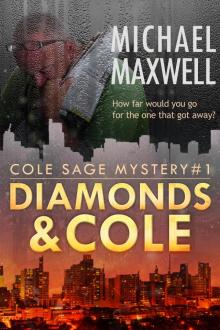 Diamonds and Cole: Cole Sage Mystery #1
Diamonds and Cole: Cole Sage Mystery #1 Dead Beat
Dead Beat![[Cole Sage 03.0] Helix of Cole Read online](http://i1.bookreadfree.com/28/cole_sage_03_0_helix_of_cole_preview.jpg) [Cole Sage 03.0] Helix of Cole
[Cole Sage 03.0] Helix of Cole Dupree's Rebirth
Dupree's Rebirth Dupree's Resolve
Dupree's Resolve Dead Duck
Dead Duck East of the Jordan (A Logan Connor Thriller Book 2)
East of the Jordan (A Logan Connor Thriller Book 2) Dead Beat (Flynt and Steele Mystery Book 1)
Dead Beat (Flynt and Steele Mystery Book 1) Dead Duck (Flynt & Steele Mysteries Book 2)
Dead Duck (Flynt & Steele Mysteries Book 2)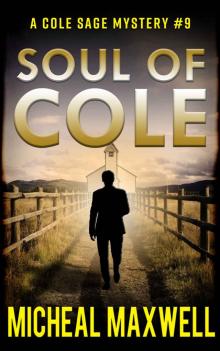 Soul of Cole
Soul of Cole Clean Cut Kid (A Logan Connor Thriller Book 1)
Clean Cut Kid (A Logan Connor Thriller Book 1) Cellar Full of Cole: A Cole Sage Mystery #2
Cellar Full of Cole: A Cole Sage Mystery #2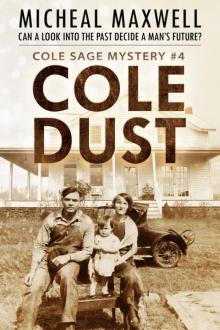 Cole Dust Cole
Cole Dust Cole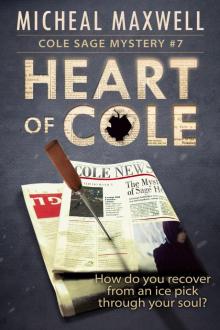 Heart of Cole
Heart of Cole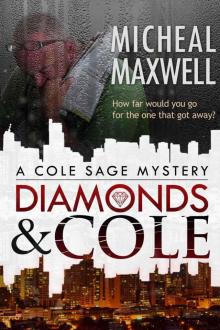 Diamonds and Cole: A Cole Sage Mystery
Diamonds and Cole: A Cole Sage Mystery Helix of Cole
Helix of Cole Cole Shoot
Cole Shoot